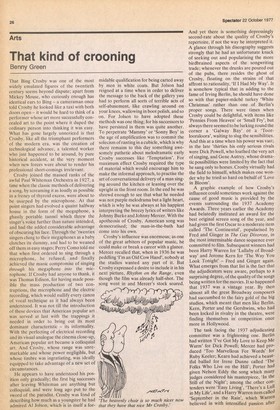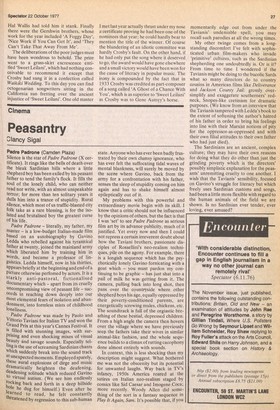Arts
That kind of crooning
Benny Green
That Bing Crosby was one of the most widely emulated figures of the twentieth century seems beyond dispute; apart from Mickey Mouse, who curiously enough has identical ears to Bing — a cameraman once told Crosby he looked like a taxi with both doors open — it would be hard to think of a performer whose art more successfully concealed art to the point where it duped the ordinary person into thinking it was easy. What has gone largely unnoticed is that Crosby, like all the triumphant performers of the modern era, was the creation of technological advance, a talented worker who just happened to be around, by pure historical accident, at the very moment when new forces were about to render his professional short-comings irrelevant.
Crosby joined the massed ranks of the awful Paul Whiteman Orchestra in 1927, a time when the classic methods of delivering a song, by screaming it as loudly as possible in a frenzy of thyroid excess, were about to be usurped by the microphone. At that point singers had evolved a quaint halfway house in the form of the megaphone, a ghastly portable tunnel which threw the singer's voice further than nature intended, and had the added considerable advantage of obscuring his face. Through the 'twenties singers clung to their megaphones as a baby clutches its dummy, and had to be weaned off them in easy stages; Perry Como told me that when first ordered to sing through a microphone, he refused, and finally achieved the manic compromise of singing through his megaphone into the microphone. If Crosby had anyone to thank, it was Thomas Edison, for having made possible the mass production of two contraptions, the microphone and the electric recording, which would nullify every canon of vocal technique as it had always been understood. It was not till the introduction of these devices that American popular art was served at last with the trappings it needed in order to bring out its most dominant characteristic — its informality. With the perfecting of electrical recording and its visual analogue the cinema close-up, American popular art became a colloquial art. And Crosby, whose range was unremarkable and whose power negligible, but whose timbre was ingratiating, was ideally equipped to take advantage of a new set of circumstances.
He appears to have understood his position only gradually; the first big successes after leaving Whiteman are anything but colloquial, and were long ago put to the sword of the parodist. Crosby was fond of describing how much as a youngster he had admired Al Jolson, which is in itself a for midable qualification for being carted away by men in white coats. But Jolson had reigned at a time when in order to deliver the message to the back of the gallery you had to perform all sorts of terrible acts of self-abasement, like crawling around on your knees, wallowing in boot polish, and so on. For Jolson to have adopted these methods was one thing; for his successors to have persisted in them was quite another. To perpetrate 'Mammy' or 'Sonny Boy' in the age of amplification was to commit the solecism of ranting in a cubicle, which is why there remains to this day something awesomely pathetic about melodramatic early Crosby successes like 'Temptation'. For maximum effect Crosby required the type of material which would encourage him to make the informal approach, to practise the art of conversational delivery of a man singing around the kitchen or leaning over the upright in the front room. In the end he was shrewd enough to see that what he needed was not purple melodrama but a light heart, which is why he was always at his happiest interpreting the breezy lyrics of writers like Johnny Burke and Johnny Mercer. With the apotheosis of Crosby, American song was democratised; the man-in-the-bath had come into his own.
Crosby's influence was enormous; as one of the great arbiters of popular music, he could make or break a career with a glance. Mercer recalled that, when in 1936 he was peddling 'I'm an Old Cow Hand', nobody at the studios wanted any part of it. But Crosby expressed a desire to include it in his next picture, Rhythm on the Range, even though the film was already half-shot. The song went in and Mercer's stock soared. And yet there is something depressingly second-rate about the quality of Crosby's repertoire, if not the way he interpreted it. A glance through his discography suggests strongly that he had an unfortunate knack of seeking out and popularising the more birdbrained aspects of the songwriting trade; whenever the drunks are poured out of the pubs, there resides the ghost of Crosby, floating on the strains of that affront to rationality, 'If I Had My Way'. It is somehow typical that in adding to the fame of Irving Berlin, he should have done so with that papier-mâché turkey 'White Christmas' rather than one of Berlin's proper songs. There were times when Crosby could be delightful, with items like 'Pennies From Heaven' or 'Small Fry', but always there seemed to be lurking round the corner a 'Galway Bay' or a `Toorlooraloora', waiting to slug the sensibilities. And this at a time when his power was vast; in the late 'thirties his only serious rivals were Dick Powell, who loathed the very act of singing, and Gene Autrey, whose dramatic possibilities were limited by the fact that he sang only to horses. Crosby virtually had the field to himself, which makes one wonder why he tried so hard on behalf of 'Love in Bloom'.
A graphic example of how Crosby's influence could sometimes work against the cause of good music is provided by the events surrounding the 1937 Academy Awards. Three years earlier the Academy had belatedly instituted an award for the best original screen song of the year, and had given the first Oscar to a moderate item called 'The Continental', popularised by Fred and Ginger in The Gay Divorcee, in the most interminable dance sequence ever committed to film. Subsequent winners had been Harry Warren for 'Lullaby of Broadway' and Jerome Kern for 'The Way You Look Tonight' — Fred and Ginger again. What emerges from that list is the fact that the adjudicators were aware, perhaps to a surprising degree, of the quality of the songs being written for the movies. It so happened that 1937 was a vintage year. By then almost all the great Broadway composers had succumbed to the fairy gold of the big studios, which meant that men like Berlin, Kern, Porter and the Gershwins, who had been locked in rivalry in the theatre, were finding themselves in competition once more in Hollywood.
The task facing the 1937 adjudicating committee was a frightening one. Berlin had written 'I've Got My Love to Keep Me Warm' for Dick Powell; Mercer had produced 'Too Marvellous For Words' for Ruby Keeler; Kearn had achieved a beautiful ballad for Irene Dunne called 'The Folks Who Live on the Hill'; Porter had given Nelson Eddy the song which manY judges considered his masterpiece, 'In the Still of the Night'; among the other contenders were 'Easy Living', 'There's a Lull in My Life', and a Harry Warren item called 'September in the Rain', which Warren believed in with intensified passion after Hal Wallis had told him it stank. Finally there were the Gershwin brothers, whose work for the year included 'A Foggy Day', 'Nice Work if You Can Get It', and 'They Can't Take That Away From Me'.
The deliberations of the poor judges must have been wondrous to behold. The prize went to a grass-skirt excrescence entitled 'Sweet Leilani', which had nothing conceivable to recommend it except that Crosby had sung it in a confection called Waikiki Wedding, To this day you can find octogenarian songwriters sitting in the California sun fretting over the ancient injustice of 'Sweet Leilani'. One old master I met last year actually thrust under my nose a certificate proving he had been one of the nominees that year; he could hardly bear to mention the title of the winner. Of course the blundering of an idiotic committee was hardly Crosby's fault. On the other hand, if he had only put the song where it deserved to go, the award would have gone elsewhere and a small victory would have been won for the cause of literacy in popular music. The irony is compounded by the fact that in 1933 Crosby was credited as part-composer of a song called 'A Ghost of a Chance With You', which is as superior to 'Sweet Leilani' as Crosby was to Gene Autrey's horse.



































 Previous page
Previous page